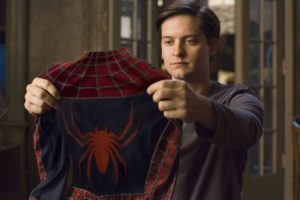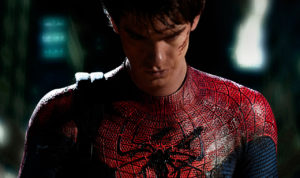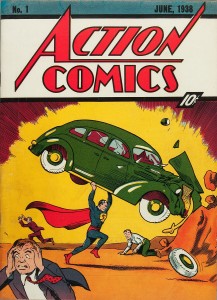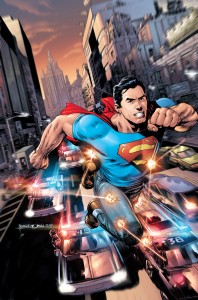
To be fair, I don’t know if any of us really wanted to see a fourth film of Maguire’s puffy prematurely-balding version of Peter Parker.
We are living in the age of the reboot.
Last week, Amazing Spider-Man relaunched the webhead’s cinematic universe while the body of the old Tobey Maguire series was still warm. There’s a new Dallas series on TV. Sherlock Holmes revisionist history movies are being released alongside a present-day version of the detective on BBC TV.
So do those older, original versions matter?
Alternate Future History
Think about your favorite TV show or series of books. It’s a serialized, ongoing story that builds with every installment and references its past. You love it. You watch every episode and buy every volume. You are a super-fan.
What if there was some prior series with the same characters and concepts, but it was not a part of the current story you love? Would you buy it? This is increasingly common in our age of reboots. If you loved the new JJ Abrams Star Trek movie – which departs from the traditional Trek timeline post-Enterprise – are the other TV series and films automatically a must-watch? What about past Spider-Man movies, original Dallas, Sherlock Holmes books, Charlie’s Angels, G.I. Joe, Inspector Gadget, or Battlestar Galactica?

To me, Garfield is the perfect embodiment of Peter Parker – thin, gangly, awkward, and genuine.
Probably not. All those past series are just an alternate reality to the present ones. You don’t need to watch both.
Case Study: DC’s Crisis of Collected Editions
DC Comics is one year into their successful line-wide New 52 reboot. Now they’re faced with a major crisis: they have a huge back catalog of trade paperbacks and hardcovers that might not matter.
DC’s rich history of iconic characters stretches back to 1938. Superman, Batman, Wonder Woman – these heroes emerged as pure archetypes and over many decades evolved into the rounder, more dynamic characters they are today. There are many hundreds of older issues of their exploits available to reprint and press into the hands of eager young fans of today.

Action Comics #1, 1938
Except, today’s characters are not the same people – and I don’t just mean their personalities. DC’s Crisis On Infinite Earths rebooted everyone back in 1984, making post-1984 books the equivalent of new-Trek. Some of the characters beneath the masks of Flash and Green Lantern weren’t even the same as before! Then, after many years of tweaking, DC rebooted again last fall – creating a new-new-Trek.
What wasn’t immediately evident from those #1 issues was that some characters survived more intact than others. Batman’s corner of the DC Universe? Seemingly mostly the same, even if Bruce is younger than before. Superman? Origin retold from scratch, parents now dead, never in a relationship with Lois. Wonder Woman? Major changes in the Amazonian status quo, right down to her parentage.
Which brings me to my titular question: do DC Comics Collections matter? Yes, there are the Watchmen and the Killing Joke, the indisputable evergreen classics of the comics medium that will move units regardless of if their stories still count for anything.
But what about DC Archives, their premium hardcover reprints of Golden and Silver Age comics? What about Wonder Woman #205? Action Comics #527? The 70s Green Arrow / Green Lantern series?

Action Comics #1, 2011
None of it counts in continuity, so does it matter anymore? These classic stories have little to nothing to do with the current state of my favorite heroine. They aren’t all prohibitive classics. So, is there any point in reprinting them?
(Marvel doesn’t have this problem. Aside from some isolated soft reboots of certain characters, everything still counts, all the way back to the 40s. Every issue of X-Men is acknowledged and in continuity.)
Does the alternate past matter? You decide.
I want to know what you think. Do older stories still have a place post-reboot? If you loved JJ Abrams’s Star Trek did you immediately jump back to rewatch the original series?
And, on our case study: Should DC even bother to reprint non-seminal stories of characters other than Batman if they don’t matter in current continuity?
What do you think?
Speaking as someone with no real literacy in comic books: to what extent are superheroes archetypes, rather than actual characters? There are plenty of mythological traditions where you get conflicting stories about a given figure, but people manage to take them in stride. Even the book of Genesis has got two creation stories — not a reboot, I guess, but the sort of thing that I can picture some neo-Assyrian Comic Book Guy dubbing the “Worst. Creation narrative. Ev-er.” And yet people seem to take it more or less in stride.
This has been on my mind a bit lately, as some of my frequented podcasts have brought up this very topic.
I coming at this as generally a non-comic fan. Of all the major realms of geek culture, comics were a big one that mostly eluded me. The big reason is that, more often than not, I’m a person who likes to start at the beginning and follow through to the end. This is easy with books, movies, and most television. In my formative years, however, the comic world felt like a sprawling rabbit hole that was easy to get lost in. Mind you, this was before the digital age, so to actually have a guide of where to start and differentiate between various series and universes was not as easy.
I’ll occasionally read a random graphic novel and had a big fling with Oni Press titles in the early aughts, but to this date I remain blind on the specifics of major DC and Marvel titles. (Any familiarity I have is the result of movies, TV, and being friends with genuine comic fans). This is actually why I found the new DC #1 approach interesting. I haven’t picked up any of the titles yet, but for the first time in years I felt legitimately encouraged to start reading regularly.
On the topic of reboots in general, there are two approaches I find most effective. The first is “Familiar story tailored to a strong authorial voice.” The best example of this is Nolan’s Batman films. I know the story of how Bruce Wayne became Batman. We all do. Still, to see the universe re-imagined as a gritty urban-crime saga made the endeavor feel fresh an unique, and fitting in the oeuvre of it’s director. Likewise, Sherlock Holmes is less a character than a cultural institution, one that I wasn’t sure needed another umpteenth adaptation (take a gander at the “screen adaptations of Sherlock Holmes” section of Wikipedia to see what I mean). That said, I was immediately hooked on Steven Moffat’s Sherlock – not only because it convincingly translated the character directly into the modern era, but because it somehow remained recognizably Doyle while being recognizably Moffat. (This is precisely why the new Spider-Man doesn’t look interesting to me; Marc Webb can put together a pretty image, no doubt, but he doesn’t yet have a distinct voice that makes me was to re-experience Peter Parker’s origins)
The second approach, and this ties more into your question of jumping into the history of characters, is the “Back to Basics” approach. This is when after years and years of convoluted mythology and excess threaten the legacy of a series, and it’s time to start fresh. the Abrams Star Trek, the Daniel Craig Bond films, and the (wonderful) Russell Davies Doctor Who reboot all fall into this category. They wink to and acknowledge the continuity of the past, but recognize that the way to preserve and honor the legacy of the series is to give the public a chance to latch on. This isn’t to say the past doesn’t matter; to the people behind these projects, it does. But Nemesis and Enterprise didn’t exactly dispel any false notions of what Trek fans were like. And on the sci-fi totem, classic Doctor Who ranked far lower in public esteem – almost as low as the original Battlestar.
People may not be lining up to watch old episodes of 60s sci-fi shows, or dig into the DC archives for vintage Superman comics, but a successful reboot should give people at least a broader understanding and respect for a classic property’s legacy and impact.
To me, a reboot is a fresh story, which likely has some elements in common with the original story and some differing. If I love a reboot and have never seen the original, whether I seek it out or not will depend on what I know about the commonalities. For example, I have no interest in watching the original Battlestar Galactica, because what I most love about the reboot is the tough sociopolitical dynamics and deep character development, neither of which (from what I’ve heard) the original have to the same extent. If, instead, I loved the space adventures and humans vs. Cylons conflict, I’d probably watch it.
So the originals should always be kept around and made available, not because of continuity with the reboot, but because they told a good story, and people may want to read that story again. Or for the first time!
Having seen all the various movie adaptations of Batman, I see value in all of their portrayals. Sure, the Dark Knight series is hands down my favorite both in the depiction of Batman himself but also the aesthetic. But I like that the different Batman/Bruce Waynes show different aspects of the same man. Bale’s Batman is, to me, the most realistic, but the other films allow us to meet the more likeable, less crazy side of him, or the more brooding side. Therefore, I think that all previous incarnations should be available because to me, from a character perspective, all of those stories and character development are part of the same person.
As for the Abrams Star Trek, I had thoughts of going back and watching a lot of the original series, but then I remembered that it just wasn’t as good as the movie in general. But it did make me really appreciate the characters from the original series. I think they were developed in the right way to fit in with the “reality” of the original series. So again, to me it felt like something to add to the complexity of the characters, rather than a fresh start.
I consider some movie reboots blasphemous because the originals were so damn good or at least fondly remembered. By in large, remakes are unimaginative Hollywood whoring of a successful concept. A few that come to mind: The Longest Yard, Red Dawn (coming soon with North Koreans as the bad guys), Rollerball, etc. Movies so awful they taint the memory of the original film.
However, some remakes reinvent the story… Battlestar Galactica, True Grit, The Thing. All awesome.
I think it’s all in the execution and vision. And don’t forget context. For some of us, a remake is the first time we’ve seen a movie. Still it’s a little weird when a reboot comes out so soon after the original.